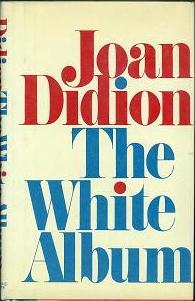The White Album
As you might guess from the name, this book of essays is meant to be in equal parts a rejection and a transcendence of the sixties that came before it — it is at times in direct conversation with its prequel, Slouching Towards Bethlehem, a book I not just loved but a book that to me cemented Didion as the writer to whom all others must be implicitly compared (and in most cases found wanting.)
This is clearest in the book's titular essay, which is also its first and strongest. Didion feints at having a bit of a nervous breakdown before stating it (later in the essay, and many times throughout the book) outright — that her reaction to the close of the sixties (which she so shrewdly and beautifully examined) was something like existential crisis:
The princess is caged in the consulate. The man with the candy will lead the children into the sea. The naked woman on the ledge outside the window on the sixteenth floor is a victim of accidie, or the naked woman is an exhibitionist, and it would be "interesting" to know which. We tell ourselves that it makes some difference whether the naked woman is about to commit a mortal sin or is about to register a political protest or is about to be, the Aristophanic view, snatched back to the human condition by the fireman in priest's clothing just visible in the window behind her, the one smiling at the telephoto lens. We look for the sermon in the suicide, for the social or moral lesson in the murder of five. We interpret what we see, select the most workable of the multiple choices. We live entirely, especially if we are writers, by the imposition of a narrative line upon disparate images, by the "ideas" with which we have learned to freeze the shifting phantasmagoria which is our actual experience.
(And compare this to a quote from a later essay in the book, In The Islands:)
I tell you this not as aimless revelation but because I want you to know, as you read me, precisely who I am and where I am and what is on my mind. I want you to understand exactly what you are getting: you are getting a woman who for some time now has felt radically separated from most of the ideas that seem to interest people. You are getting a woman who somewhere along the line misplaced whatever slight faith she ever had in the social contract, in the meliorative principle, in the whole grand pattern of human endeavor. Quite often during the past several years I have felt myself a sleepwalker, moving through the world unconscious of the moment’s high issues, oblivious to its data, alert only to the stuff of bad dreams, the children burning in the locked car in the supermarket parking lot, the bike boys stripping down stolen cars on the captive cripple’s ranch, the freeway sniper who feels “real bad” about picking off the family of five, the hustlers, the insane, the cunning Okie faces that turn up in military investigations, the sullen lurkers in doorways, the lost children, all the ignorant armies jostling in the night. Acquaintances read The New York Times, and try to tell me the news of the world. I listen to call-in shows.
These are long passages that strike at the soul of what is the most interesting part of The White Album — to listen to a woman who in almost every circumstance has keenly mastered the written word and the power of narrative, only to find both fail her, and fail the world.
"Didion gets diluted" is an uncharitable way to describe what I did not like about the book; a more charitable and winking way might be "an abundance of B-sides". Didion has things she wants to say about cult leaders, so there isn't a single essay about them but three; Didion has things she wants to say about the symbolism of changing California architecture, but there are four separate discurses without much gestalt. There's a lot more sameness in this book — ostensibly about the chaos beyond the chaos! — than in Where I Was From or the aforementioned Slouching Towards Bethlehem; it felt like a sitcom that would have been a tight thirteen episodes but the network ordered twenty-two.
And I think the highs are the highest of all. I called out two of my favorites already but On the Road (ha!) and On the Mall were gems as well; I think a version of this book with parts two and three (on California and on Women, respectively) removed would make for an all-timer for me, not because Didion's writing on either subject is lackluster but because they lack the combination of personal & professional incision that renders her greatest work.
My recommendation: if you haven't read her greatest three books, go read them. And then come here, and feel comfortable with your thumb hovering about the fast-forward button.
